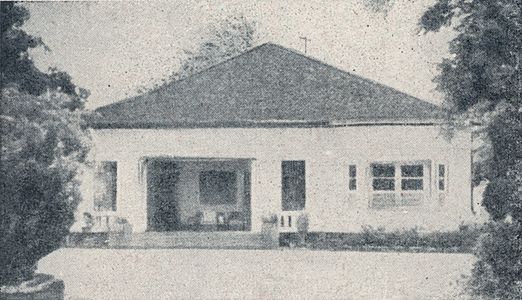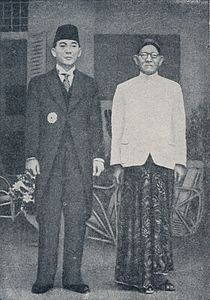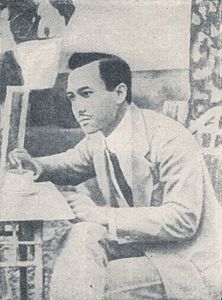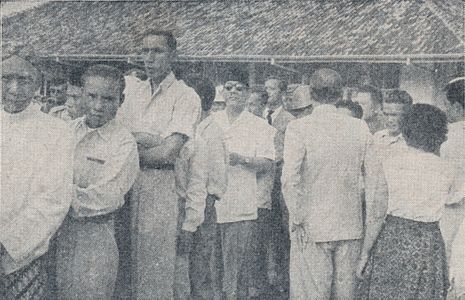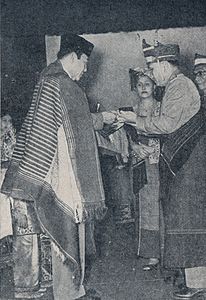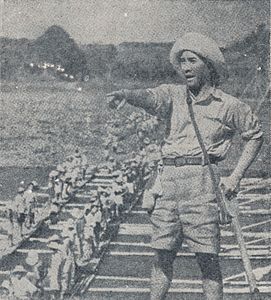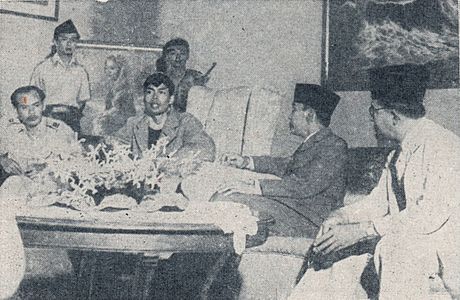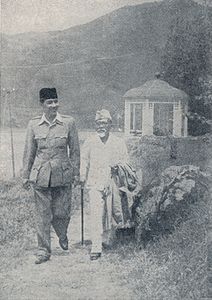Talk:Sukarno
| Sukarno was nominated as a History good article, but it did not meet the good article criteria at the time (September 24, 2013). There are suggestions on the review page for improving the article. If you can improve it, please do; it may then be renominated. |
| This It is of interest to the following WikiProjects: | ||||||||||||||||||||||||||||||||||||||||||||||||||||||||||
| ||||||||||||||||||||||||||||||||||||||||||||||||||||||||||
| A fact from this article was featured on Wikipedia's Main Page in the On this day section on March 11, 2005, March 11, 2006, March 11, 2007, March 11, 2008, March 11, 2009, and March 11, 2010. |
Additions[edit]
I made additions to this page.Sukarno, in the late 1950s, did not receive aid from the Soviet Union per se, but from Poland, Czechoslovakia, and later from West Germany and Italy. He received arms from Soviet BLOC countries, but not the USSR. Also, the Eisenhower Administration made sure that they gave more military aid to Sukarno than he would get from the Soviet bloc. This is all well documented in the Kahin book i placed on the reference page, pages 206-209. All facts come from released US Gov't documents.
Lastly, I added a bit on the PRRI rebels, a portion of this page I found deficit after reading the Kahin book. The forces were weak and EXTREMEMLY supported by pro-Western donors both private and public. The CIA, the Taiwanese, and the Filipinos gave lots of arms to the rebels on Sumatra and later even more to those on Sulawesi. It was these arms, including planes in Sulawesi, that embarrassed the United States soon after when the pilot was shot down doing bombing raids on Sulawesi. He was sentenced to death, but Robert Kennedy secured his release in 1961. His name was Allen Pope. This, too is well documented in the Kahin book, pages 179-182.
thomas
Are you sure about the Achmad? I thought he only had the one name. M.e 07:22, 9 May 2004 (UTC)
I remember reading that Time magazine(??) in the 60's couldn't cope with him having only one name and made the Achmad bit up.
I have made significant additions to this page, but no deletions. The additions are:
- headings
- the panca sila
- more about 'guided democracy'
- more detail about Sukarno's removal from power
All my additions are attributed from academic sources - see references at bottom of article.
controversial change: I note that there has for many versions appeared on this page a claim that Sukarno was toppled by the US Administration. I could find no source for this claim, and so moved it to the 'removal from power' section as a NPOV issue. I think the claim is significant and warrants an authoritative source before it can be put in the introductory paragraph of this article.
I note that authoritative historians on Indonesia, particularly Benedict Anderson and Robert Cribb, who are no fans of the USA policy towards Indonesia's occupation of East Timor, nevertheless found no evidence of a US role in the toppling of Suharto. On that evidence, it seems to be all Suharto's work.
I would also add that the attribution of Suharto being 'pro-American' has NPOV issues. America was certainly pro-Suharto, but I think the only thing Suharto was pro- was pro-Suharto!
What do you all think? Mercurius 10:31, 29 Jun 2004 (UTC)
- It sounds right. (Not knowing much about Indonesia, I can't definitively judge one way or another.) What I know is that the CIA did want Sukarno out, but of course that doesn't necessarily mean they were the cause of his downfall. A-giau 05:43, 20 Sep 2004 (UTC)
Sukarno's name[edit]
I'm going to remove "Achmad" from Sukarno's name again; as the article notes, he is known simply as "Sukarno". Every single authoritative history of Indonesia I've read uses the single name - I can cite specifics anyone is interested. There are now two potential sources of the "Achmad" name; 1) mentioned by User:Peacenik above and vaguely familiar to me as well, is that a confused American reporter added it in the 1960s; and 2) that Sukarno chose it after a hajj. Given that there are two conflicting stories, and that the vast majority of print sources don't use it at all, I think a good citation of its source is necessary before we insert it in the article. (Some potentially interesting background on Indonesian (Javanese, really) names if anyone is still interested: [1]) CDC (talk) 03:57, 13 Apr 2005 (UTC)
- I'm Indonesian, and i never heard anything about the "Achmad Soekarno" name, nor my parents and my grandparents. Here in Indonesia, He was simply known as "Soekarno", "Ir.Soekarno", or "Bung Karno." —Preceding unsigned comment added by 202.81.62.142 (talk) 02:44, 28 January 2008 (UTC)
[edit]
After some thought and consideration, I created an Indonesia-related topics notice board, along the same lines as other regional notice boards (such as those for Malaysia and Africa). This was established to coordinate efforts to improve Indonesia-related Wikipedia entries. If you've made contributions to Indonesia-related articles in the past, or would like to, please take some time to visit, introduce yourself, and sign the roster.
Confusion between "Sukarno" and "Suharto"[edit]
There seems to be some confusion between Sukarno and Suharto in the section "Removal from Power", specifically in the second paragraph. Then again, I'm not up on Indonesian history, so maybe not. Cottingham 20:04, 18 January 2006 (UTC)
This has been the dark side of Indonesian History. What happened on the surface was Soeharto leading the army to crack down the communist party and not long after that resume power from Soekarno. Some said it was Soeharto's politic to grab the power from powerless Soekarno (due to his illness and loss of support), some saw Soeharto as hero who saved the country. The truth is, the fact is blur and evidence is doubtful, for both cases. BlueCall 05:05, 19 June 2006 (UTC) (talk)
doubtful neutrality[edit]
Too many US-bashers have edited this one. The article's tone is in many places much too leading and apologetic. Stick to the facts people.—Preceding unsigned comment added by 207.38.221.39 (talk) 11 March 2006
This article includes fantasy and un-cited insights to the soul of people, e.g. "because he thought both systems worsened the life of Indonesian people", "but abruptly abandoned him to save themselves", and "approached him with respect". It also asserts un-cited claims such as "he had become a popular hero". As a comment I mention that I have not seen any chronicles of the day suggesting Sukarno was a popular hero before the war. There is a English translation of Bernhard Dahm's "Sukarno and the Struggle for Indonesian Independence", which I suggest any scholar interested in Sukarno would find worth reading for it's examples of Sukarno's war time history.Daeron (talk) 00:06, 5 May 2010 (UTC)
The name should not be altered ![edit]
Sukarno was never Sukarno at all,.. the name is "Soekarno". Yes, it was the old spelling, with the same pronuncation, but a name is a name, it should not change ! I would like to suggest to correct the spelling, "Soekarno" and not "Sukarno". Same goes to "Soeharto" and not "Suharto" BlueCall (talk) 04:59, 19 June 2006 (UTC)
The Sukarno spelling cited as having changed in 1947 is erroneous. The Perfected Spelling decree (EYD) was passed in 1972, but personal names were allowed to retain their old Dutch orthography at the option of the person. Since Soekarno died before this change, his name should never appear as Sukarno. — Preceding unsigned comment added by 202.152.194.170 (talk) 12:37, 13 February 2012 (UTC)
Note on the part BACKGROUND:
Native people where not allowed to sit in front of the screen at the movies. Only European people where allowed to watch a movie sitting in front of the screen. So it was not because Sukarno did not have any movie, that he was sitting behind the screen.
C.Z.S. Nanuruw The Netherlands
Note on the part BACKGROUND: Sukarno at the movies[edit]
Note on the part BACKGROUND:
Native people where not allowed to sit in front of the screen at the movies. Only European people where allowed to watch a movie sitting in front of the screen. So it was not because Sukarno did not have any movie, that he was sitting behind the screen.
C.Z.S. Nanuruw The Netherlands
Retrieved from "http://en.wikipedia.org/wiki/Talk:Sukarno"
Sukarno[edit]
"The most prominent critic of Western democracy was Sukarno, who, rather than being forced, gave the distinct impression of being keen to offer his services to the new conquerors. The metamorphosis of Sukarno from a prewar Marxist-tinged anti-imperialist into a Japanese cooperator par excellence is striking, and cannot solely be attributed to his consummate acting skills."
...
"Sukarno and the other leaders tried to use the Japanese im- posed mass organisation, PUTERA, primarily to strengthen na- tionalist sentiment among the people."
...
"With the war approaching Indonesian territory itself, on 1 March 1945 the Japanese announced that a committee to investigate Indonesian independence would be established."
...
"The rapid deterioration of the Japanese military situation in South-East Asia forced the time schedule for the granting of Indonesian independence to be put forward and on 7 August 1945 the Radjiman committee was replaced by a committee for the preparation of independence, headed by Sukarno and Hatta, and consisting of twenty members representing a cross-section of opinions and interests of the nation as a whole. Sensing that the great event, fervently yearned for so long, was near, Sukarno, in a now famous speech, referring to the prophesies of Djojobojo an ancient Javanese king who had foretold the demise of Dutch colonial rule, told the Indonesian people that the country would be free before the corn would ripen.
On 8 August, Sukarno, Hatta and Radjiman were flown to Japanese headquarters in Saigon to be told by Marshal Terauchi that Indonesia would be granted its independence in the immediate future and urged them to speed up their preparations.
The Japanese occupation policies had engendered enormous psychological and social changes in Indonesian society shattering any chances for a return to the prewar colonial system. Indeed, the Japanese occupation meant much more than merely a change of colonial masters. In fact it proved to be a major watershed in modern Indonesian history in forging an entirely different dimension in the popular Indonesian mentality regarding colonialism and imperialism. It was particularly the younger generation that, unlike many of their elders, was absolutely opposed to the return of the Dutch colonial regime, which not only had lost all credibility and prestige by their 1942 defeat, but also was hated as a result of Japanese indoctrination and military training."
- C.L. Penders, 2002 see http://www.papuaweb.org/dlib/bk/penders2002/01.pdf
- Is there a point to this thread? Does the poster actually have a request? A succint statement of its intent would help. Merbabu 03:48, 19 December 2006 (UTC)
Curious[edit]
"..led by Sukarno, a major figure in the non-aligned movement."
Again, I find it curious the lack of alternative sources. It seems the suharto elite still have the upper hand on the internet even though I have yet to find a serious scholar or serious historic documentary in the west reffering to Sukarno as anything but a major figure in the "_non-aligned_ independence movement of the former colonies of the "third world". As to allegations that Sukarno needed or actively befriended the japanese to start or incite the independence movement, it's kind of hard to belive considering the way the japanese treated all their colonies as well as the fact that none of the japanese colonies would ever be granted independence during or under japanese rule. But the english as well as the french and the dutch and the Belgians _must_ have seen what was coming. The british had had experience first hand with one of the greatest figures and inspirators of the former colonial nations, Mahatma Ghandi. Who indeed was one of the figures that Sukarnos next in command Mohammad Hatta (see wiki on Hatta) went to visit as well as Nehru.
wiki: "During this time, Hatta was sent out of the country to look for support for Indonesia. One country that he went to was India, the homeland of his old friend, Nehru. Disguised as an aeroplane, co-pilot, Hatta sneaked out of the country to ask for assistance. There he asked Nehru and Mahatma Gandhi for help. Nehru assured him that India will support Indonesia and will make the support known at international forums such as the United Nations (UN)."
So both the indonesians and the japanese must easily have been able to foresee the independence struggle that would follow, and that it would take or need little or no "help" from the japanese as it also turned out.
In fact the japanese would have little or nothing _to_ help sukarno's independence movement with during the end stages and after it's defeat with Hiroshima and Nagasaki.
As to the near top comment on the page that there is no evidence of US involvement in the 1965 coup I can find no words, and I'm only stupefied as to why no moderator/admin has been here to remove the comment, along with claims that the holocaust never occured. perhaps this is considered a point of view, and I'd like a serious discussion on that where people actually go to the trouble of refuting the validity of sources already posted across the internet including those already admitted to other pages in wikipedia.
I'd _really_ like to see someone, no, _anyone_ posting serious sources, facts, or cite historians, scholars, publications _with_ references or ANY other _clear_ evidence that the CIA did NOT have anything to do with the 1965 coup! please! _anyone_! Sincerely,John Smith (nom de guerre) 12:12, 23 November 2006 (UTC)
- Links are found across the internet, but a collection should be found in the archives of the talk/discussion pages of Indonesia at this point. I'll even dig up more of the reference material and the footnotes from the footnotes of that page and the history of Indonesia page as well
- But I suggest people interested take a look at Woodward's book on CIA's secret wars. I am not aware that neither he nor his work or this brick of a book has ever / yet been discredited.
- for the time being that's all until I've made a better list of what should be valid credible sources that are backed up by peers and whatnot.John Smith (nom de guerre) 12:24, 23 November 2006 (UTC)
Footnotes[edit]
I have just added a citation for the claim that US diplomats admitted to providing a hit-list to Suharto, but the footnotes on this page are a bit of a mess, there are no <ref> tags used, and I can't find any reference to the system that is being used anywhere in the style guide. If I'm being dense, could someone fix up what I've added, if I'm not then maybe someone could fix up the rest of the references on this page.
Dan 16:17, 30 November 2006 (UTC)
His notorious collaborationism with the Japanese occupiers[edit]
Here [2] I found some interesting information on the abovementioned subject. Does anyone know more about Romusha? This guy was a big-fish collaborator, by accounts.
9 Mar 1943 : Putera ('Pusat Tenaga Rakyat') was set up with Sukarno as Chairman; however, his reputation was tarnished by his role in recruiting Romusha, a conscription of Indonesian laborers to serve the Japanese army, not only in Indonesia, but also in other parts of Southeast Asia (estimated that 270,000 romusha were sent Outer Islands and Japanese-held territories in Southeast Asia, but only 52,000 were repatriated to Java); Sukarno's collaboration with the Japanese gov't (who was hostile to the Allies) also brought into being a familiar refrain in his oratory 'Amerika kita setrika, Inggris kita linggis !'.
Proudlyhumble07 06:54, 22 April 2007 (UTC)
Is it just me who laughs at the argument 'collaborationist as a category is POV and therefore unacceptable' while maintainng the category 'Indonesian national heroes' should be there and is not just the same? For the sake of balance they should both be there or neither. I favour both. This person made a free decision to enthusiastically collaborate with the Japanese fascists from 1942 and was honoured and richly rewarded by them for it too. He played no small role in coordinating the provision of forced labour (including troops) and materiels (eg. fuel) for their war aims. Interestingly the article relates 'Sukarno refused to ever talk about his actions during the war' but thankfully we have historians who can fill in the gaps. He made his bed and so he can lie in it with an appropriate classification.Proudlyhumble07 08:56, 22 April 2007 (UTC)
- David York, please stop trolling. Merbabu 09:06, 22 April 2007 (UTC)
The category 'Indonesian National Heroes' is not POV. It is an official title bestowed by the Indonesian government. Davidelit 03:32, 23 April 2007 (UTC)
- mmhmm. What 'title' is there for enthusiastic collaboration with fascist and militarist occupiers? Oh, that's right, you get promised a good government job and the personal thanks of the Emperor for your thorough efforts in enslaving your countrymen ... & the (unofficial) 'title' of collaborator.Proudlyhumble07 08:29, 23 April 2007 (UTC)
- yet to hear a good reason why this person doesn't qualify as a collaborationist. If you wanted to nominate any person in Asia who exemplified the term, it would be this person.Proudlyhumble07 06:44, 24 April 2007 (UTC)
1965 Coup and massacres: U.S. and CIA involvement[edit]
In other wiki pages on Indonesian history (then named "the owerthrow of Sukarno") I've provided several links to multiple sources that verify the US involvement in the Indonesian coup by Suharto against Sukarno. Even some of the CIA's own files on the matter have been available now for several years, journalists have written articles and documentaries have been made.British involvement alongside the US and Quotes from the British ambassador/consul in Surabaya have been public knowledge for decades. Most notably on the subject is the documentary "New Rulers of The World" by award winning independent journalist and former BBC employee John Pilger. --217.144.240.250 22:09, 12 May 2007 (UTC)
sources on the indonesian massacres of 1965[edit]
just a quick google: indonesia + massacre, gave several sources.
And if google is anything to go by with their system of putting links to the most linked to and accepted in a kind of peer reviewing system,and having them appear first these should not be to extreme for even wikipedia to swallow.
http://www.hrea.org/lists/hr-headlines/markup/msg02504.html
http://www.hrsolidarity.net/mainfile.php/2005vol15no06/2463/
http://www.hrsolidarity.net/mainfile.php/2005vol15no06/2465/
http://skeptically.org/socialism/id17.html
http://www.ahrchk.net/ua/indonesia1965/
http://www.ahrchk.net/index.php
(the asian human rights commisson)
INDONESIA: How the West backed the massacre of a million people
Clinton Fernandes The destruction of the Indonesian Communist Party (PKI), 40 years ago following the seizure of power by pro-US military officers headed by General Suharto was a decisive event in the history of South-East Asia in the second half of the 20th century.
By 1965, the PKI had three million members and was said to be the largest Communist party in the world outside of the Soviet Union and China. In addition to its large membership, about 15 million people had indirect connections to the party through their membership of peasant associations, labour unions and other social movement organisations led by PKI members. It was, according to a September 1, 1965, US National Intelligence Estimate, “by far the best organized and most dynamic entity in Indonesia”.
Within a few months of the October 1, 1965, Suharto-organised military coup, however, the PKI would be destroyed in a cataclysmic campaign of political terror and mass murder carried out by the Indonesian armed forces (ABRI) and right-wing Islamic organisations.
- According to a 1968 study by the CIA, “in terms of the numbers killed the anti-PKI massacres in Indonesia rank as one of the worst mass murders of the 20th century, along with the Soviet purges of the 1930s, the Nazi mass murders during the Second World War, and the Maoist bloodbath of the early 1950s”. At least one million Indonesians were slaughtered in the anti-PKI massacres.
Nowadays, of course, Western policy-makers are trying to rehabilitate the Indonesian military's reputation in order to fight Jemaah Islamiyah.
This article, therefore, examines Western support for this anti-PKI terror campaign, which seriously weakened Indonesian political life and set the scene for the emergence of Islamic terrorism in the region. For reasons of space, it takes up the story after the massacres had commenced. Once the killings were underway, Western policy-makers and diplomats were keen to support the ABRI. The problem they faced was that President Sukarno's previous anti-imperialist rhetoric had resonated strongly with the Indonesian public. Any overt support would therefore serve only to expose the Indonesian army as a tool of the West.
Sukarno's towering reputation presented a significant obstacle. A deft touch was required. US ambassador Marshall Green understood that economic aid should not be offered because economic difficulties hurt the reputation of the civilian administration, not the army. His military contacts told him that there was an urgent need for food and clothing in Indonesia but it was more important to let Sukarno and his foreign minister, Subandrio, “stew in their own juice”.
Western media coverage
The information campaign in support of the killings was created along similar principles. The ABRI secretly urged that foreign news broadcasters not give the army “too much credit” or criticise Sukarno.
Instead, they should emphasise PKI “atrocities” and the party's role in the mutiny by left-wing ABRI officers that preceded the Suharto-led coup. While Sukarno could not be directly attacked, an Indonesian general offered to provide Western agencies background information on foreign minister Subandrio, who was regarded as more vulnerable.
Australian ambassador Keith Shann was told by his superiors that Radio Australia should never suggest that the ABRI was pro-Western or right-wing. Instead, credit for the anti-PKI campaign should be given to other organisations, such as Muslim and nationalist youth groups.
Radio Australia had an important role to play because of its high signal strength and huge audience in Indonesia. Its listeners included the elite as well as students, who liked it because it played rock music, which had been officially banned. It was therefore told to “be on guard against giving information to the Indonesian people that would be withheld by the Army-controlled internal media”.
The Australian ambassador worked to ensure that it gave “prominent coverage” to “reports of PKI involvement and Communist Chinese complicity” while playing down or not broadcasting “reports of divisions within the army specifically and armed services more generally”.
Another senior official recommended that Radio Australia “not do anything which would be helpful to the PKI”. Instead, it “should highlight reports tending to discredit the PKI and show its involvement in the losing cause”.
The US, Britain and Australia co-operated closely in the propaganda effort. Marshall Green urged Washington to “spread the story of PKI's guilt, treachery and brutality”, adding that this was “perhaps the most needed immediate assistance we can give army if we can find [a] way to do it without identifying it as [a] sole or largely US effort”.
- The British Foreign Office hoped to “encourage anti-Communist Indonesians to more vigorous action in the hope of crushing Communism in Indonesia altogether”. Britain would emphasise “PKI brutality in murdering Generals and families, Chinese interference, particularly arms shipments, PKI subverting Indonesia as the agents of foreign Communists”.
- British ambassador Sir Andrew Gilchrist wrote: “I have never concealed my belief that a little shooting in Indonesia would be an essential preliminary to effective change”.
Throughout this period, Western radio stations continued to recycle stories from Radio Jakarta or the army newspapers and broadcast them back to Indonesia. US embassy officials established a back-channel link through the US army attache in Jakarta, who regularly met with an aide to Suharto ally General Haris Nasution.
- The US embassy also compiled lists of PKI leaders and thousands of senior members and handed them over to the Indonesian military. While these kinds of lists were based entirely on previous reporting by the PKI's press, they proved invaluable to the military which seemed “to lack even the simplest overt information on PKI leadership at the time”, according to a report Green sent to Washington in August 1966.
General Sukendro, a senior army intelligence officer, secretly approached the US embassy in early October 1965, asking for assistance in the army's operations against the PKI.
This included supplying “small arms to arm Muslim and nationalist youths in Central Java for use against the PKI”.
- Green authorised the provision of 50 million rupiahs to the Kap-Gestapu movement, which was leading the anti-PKI terror campaign. He advised the State Department that there was “no doubt whatsoever that Kap-Gestapu's activity is fully consonant with and coordinated by the army. We have had substantial intelligence reporting to support this.” Overall, the US provided the ABRI with money, medicines, communications equipment, weapons and intelligence. It was satisfied with the return it received on this investment.
On February 21, 1966, Sukarno tried to reshuffle his cabinet and sack General Nasution as defence minister.
But with the public cowed in fear of the killings, Sukarno's attempt to assert his authority failed. There were large demonstrations backed by the army, and on March 11 soldiers mounted a show of force outside the presidential palace. Sukarno signed a letter of authority handing over executive power to General Suharto.
He remained president until 1967, continuing to defend the PKI and to speak out against the massacres and anti-Chinese racism that accompanied them. Without access to the media, however, his speeches failed to achieve political traction.
- In the wake of the massacres, Indonesia's pre-eminent cultural and intellectual organisations — the Peoples' Cultural Institute, the National Cultural Institute, and the Indonesian Scholars' Association — were shut down, and many of their members were arrested or imprisoned.
- More than one and a half million Indonesians passed through a system of prisons and prison camps.
The PKI was physically annihilated, and popular organisations associated with it were suppressed.
- The whole of Indonesian society was forcibly depoliticised. In village after village, local bureaucrats backed by the army imposed a control matrix of permits, rules and regulations. Citizens were required to obtain a “letter of clean circumstances” certifying that they and their extended families had not been associated with the left before 1965. Indonesian society became devoted to the prevention of any challenge to elite interests.
- Control of the universities, newspapers and cultural institutions was handed to conservative writers and intellectuals, who collaborated with Suharto's New Order regime and did not oppose the jailing of their left-wing cultural rivals. Along with the violence, certain cultural values were strongly promoted. Discussion of personal, religious and consumerist issues was encouraged, while discussion of politics was considered to be in bad taste. The conservative establishment also monopolised Indonesia's external cultural relations.
Suharto would rule for more than 30 years until a popular uprising and a crisis-ridden economy forced his resignation on May 21, 1998.
[Dr Clinton Fernandes is a historian and author of Reluctant Saviour: Australia, Indonesia and the independence of East Timor (Scribe, 2004). He is currently a visiting fellow at the Australian National University.]
213.172.204.59 16:38, 12 November 2006 (UTC)
Intro name sukarno[edit]
The entire second half of the introductory paragraph is spent talking about the name Sukarno. Given the wikipedia manual of style, this kind of trivia should really be saved forhte end of the article, especially that it does not concern history, or his life, or his impact on history. —The preceding unsigned comment was added by 63.229.221.191 (talk) 23:21, 14 May 2007 (UTC).\
- Also the whole 'Ahmad' thing may be something of a white elephant. Sukarno himself said he never used it, and I believe it was contrived by a journalist. I'll look up the reference when I have a moment, unless somebody beats me to it.. By the way, the previous poster has a point - what a dull intro 16:00, 25 June 2007 (UTC)
Removal from power[edit]
The neutrality tag has a comment re a dispute - nothing yet? Just an edit summary that suggests it could have been written by Suharto himself. So - sukarno and suharto articles are always good targets - lets see what happens next perhaps? SatuSuro 08:27, 28 April 2008 (UTC)
- I'd remove the tag if there is no explanation. Of course there might be well be issues and the articles in question do need work - but a snarky edit summary and "drive by" npov tags doesn't help anyone. --Merbabu (talk) 08:37, 28 April 2008 (UTC)
Update[edit]
I'm going to remove it - I've addressed the citation requests also provided (which seem to be the main cause of the concern, and legitimately). The less than helpful edit summary doesn't provide editors with anything else to go on.
It seems the real problem, and the problem that can be easily fixed, is a lack of in-line citations (although I note the reasonably extensive bibliography list). Reasonable wikipedia editors will note that these are works in progress, the bulk of which is actually a number of years old. And, it is not likely that every article is going to be fixed overnight (throwing around balance tags is a lot easier than finding refs). If further specific citation issues are needed, they can be addressed through the appropriate citation request tags in a manageable and in a collaborative manner. Or, specific issues can be civilly raised on the talk page. --Merbabu (talk) 12:12, 29 April 2008 (UTC)
Sukarno's name[edit]
Please note I have just removed Achmed from the lead sentence - there is no need to provide the 'invention' that foreign journalists used in the 1950's for some odd reaso - his name has been in a number of variations as found in the lead paragraph - Achmad never has been used by either Indonesians or general biographers of the person. SatuSuro 07:05, 19 May 2008 (UTC)
Also see above at http://en.wikipedia.org/wiki/Talk:Sukarno#Sukarno.27s_name - please note! SatuSuro 07:07, 19 May 2008 (UTC)
I have removed the reference to Sukarno's representing the Indonesian National Party. He did establish a party by that name in 1927, but it ceased to exist after his arrest and imprisonment. Later joined the Partindo. He was not a member of the short-lived Indonesian National Party in 1945, nor did he join the Indonesian National Party founded in 1946, but many Indoneisans continued to associate him with it as it had the same name as the pre-independence party. Davidelit (talk) 07:00, 8 August 2008 (UTC)
Personal life[edit]
I'm interested in expanding the section about Soekarno's personal life. His first marriage with Utari Tjokroaminoto, his second marriage with Inggit Garnasih, his children, his affairs with a lot of women. And also his public image in Indonesia (as the great leader, great orator, hero of independence, but also dictator and a little bit womanizer). But I can't find the sources. Anyone interested in helping me?
In Harmonia Progressio! (talk) 03:05, 1 December 2008 (UTC)
- Two good books that discuss the more personal side of Sukarno are Sukarno: An Autobiography as told to Cindy Adams (1965) and My friend the Dictator (1967) (both by Cindy Adams). Another good source is Sukarno: A Political Biography by J. D. Legge (also available in Indonesian as Sukarno: sebuah biografi politik / John D. Legge (Sinar Harapan, 1985)) Selamat membaca! Davidelit (talk) 06:24, 1 December 2008 (UTC)
- "A little bit womanizer"? He was one of the greatest womanisers the world has ever seen. The officials of the countries he visited always arranged special "parties" for him. He was infected with siphyllis when he was in Ankara, Turkey. When visiting Pakistan, Zulfikar Ali Bhutto, then the foreign minister, got him the most "charming" stewardesses of PIA. Behemoth (talk) 10:41, 13 February 2009 (UTC)
Exile, not jail[edit]
Sukarno was not in jail in 1942, he was in exile in Sumatra. Masalih (talk) 14:34, 18 April 2009 (UTC)
Fascinating ;) — Preceding unsigned comment added by 173.88.114.223 (talk) 05:42, 16 March 2012 (UTC)
The island of Flores to be exact. — Preceding unsigned comment added by 175.156.96.79 (talk) 06:06, 16 October 2012 (UTC)
Romusha was forced labor[edit]
I'm adding that romusha was forced labor. Why else would Sukarno have been ashamed of his involvement in it? Masalih (talk) 14:34, 18 April 2009 (UTC) Perhaps because he was a collaborator with a violent Axis power which the majority of Javanese did not support and did not want to supply oil to, after the war Sukarno wanted to white wash his reputation. Wikipedia articles (as oppose to talk pages) are not the place for your speculations. —Preceding unsigned comment added by 122.106.228.67 (talk) 23:50, 19 April 2009 (UTC)
Indeed, you might be right. I'm not speculating in the article, I'm motivating my change in the article. It is relevant that it was forced labor and the extra word heightens the quality of the article slightly. Masalih (talk) 07:45, 22 April 2009 (UTC)
You are wrong and should be ashamed of it.
File:DBBR.jpg Nominated for speedy Deletion[edit]

|
An image used in this article, File:DBBR.jpg, has been nominated for speedy deletion at Wikimedia Commons for the following reason: Copyright violations
Don't panic; deletions can take a little longer at Commons than they do on Wikipedia. This gives you an opportunity to contest the deletion (although please review Commons guidelines before doing so). The best way to contest this form of deletion is by posting on the image talk page.
This notification is provided by a Bot --CommonsNotificationBot (talk) 05:17, 24 August 2011 (UTC) |
File:U1513625sa2.jpg Nominated for speedy Deletion[edit]

|
An image used in this article, File:U1513625sa2.jpg, has been nominated for speedy deletion at Wikimedia Commons for the following reason: Copyright violations
Don't panic; deletions can take a little longer at Commons than they do on Wikipedia. This gives you an opportunity to contest the deletion (although please review Commons guidelines before doing so). The best way to contest this form of deletion is by posting on the image talk page.
This notification is provided by a Bot --CommonsNotificationBot (talk) 05:17, 24 August 2011 (UTC) |
Religion[edit]
Why show religion, it only shows 'Apartheid', Soekarno was in 'Unity', not deversion. Every human is equal! — Preceding unsigned comment added by ArmTheInsane (talk • contribs) 01:46, 12 August 2013 (UTC)
Note 27[edit]
Note 27 says "Hughes (2002), p.21." Nowhere in the reference list or the notes is there a title or full author's name given for "Hughes (2002)."Redound (talk) 02:18, 2 November 2013 (UTC)
- Well spotted, thanks. I fixed it. :) --Merbabu (talk) 03:53, 2 November 2013 (UTC)
"Lechery"?[edit]
I came to this page looking for confirmation/primary sources about Sukarno's (alleged) notorious fondness for the ladies; I'd inadvertently come across is in two print sources: in Killing Hope by William Blum, it is claimed the CIA made a fake sex tape featuring Sukarno to give "evidence" to these claims; and in the essay "Nasser's Egypt" Gore Vidal cites an anecdote where Sukarno embarasses Nasser's chastity by asking "where are the girls".
A quick web search for "Sukarno ladies" turns up a number of references in the top ten -- e.g. a quote from Jackie Kennedy calling him "lecherous", or an English-language Pravda article on KGB sex espionage.
So, I was surprised to see neither reference on the article, nor even a mention of its absence on the talk page. It's tawdry and unimportant on the historical scale, but as far as I can tell, his alleged appetites were what his (pre-coup) contemporaries most associated with him.
67.180.84.49 (talk) 15:28, 28 May 2014 (UTC)
- I've long been tempted to write an article on the wives of Sukarno, which would be a good start, although I'm assuming you mean references such as Laila Sari essentially saying "luckily he never bothered me" (i.e. extramarital affairs). — Crisco 1492 (talk) 15:51, 28 May 2014 (UTC)
- Figured this would be a good place to file this 2012 CNN column:
| “ | Using sex for information or as blackmail doesn’t always work. When Indonesian President Sukarno visited Moscow in the 1960s, the KGB sought to take advantage of his renowned sexual appetite, sending a batch of glamorous young women posing as air hostesses to his hotel. When the Russians later confronted him with a film of the lurid encounter, Sukarno was apparently delighted. Legend has it he even asked for extra copies. | ” |
- There are many references on the net, which link to either the above, http://english.pravda.ru/fun/2002/07/08/32009.html[dead link] or http://www.tristarmedia.com/bestofrussia/kgb3.html but I still worry it's an apocryphal story that's repeated a lot because it's so amusing.
- 71.41.210.146 (talk) 01:57, 4 September 2015 (UTC)
- This book mentions this as a CIA operation. He says pictures survive, but doesn't include any. — Chris Woodrich (talk) 00:10, 7 September 2015 (UTC)
- That is the aforementioned "Killing Hope"; I did run across another source, this time Tariq Ali's memoir "Street Fighting Days"; on p128, he writes that in Pakistan, in the presence of Zufakir Ali Bhutto (then foreign minister under Amun Khan), he was presented with "a dozen of the more 'presentable' air stewardesses and asked...to chose the pair he would most like to fly with...Sukarno had done so with a broad grin. The plane had been over an hour late in landing at Lahore. The 'great leader' had been hard at work and the Foreign Minister had evidently instructed the pilot not to land until [Sukarno]'s lust had been fully exhausted. The instruction had been obeyed, but the circumstances of the late arrival could not be kept secret. Bhutto himself remarked that Sukarno could 'never come on time'." Though again, there is no evidence or further corroboration (or, in this case, any hint of blackmail). 2601:647:4501:2510:E834:F93:ECA7:3141 (talk) 19:50, 5 March 2017 (UTC)
- Another non-fringe reference on this from last year (also maybe notable that google's first autocomplete option for "Sukar..." is now "sukarno blackmail"): https://medium.com/war-is-boring/the-cia-and-kgb-tried-to-blackmail-this-world-leader-with-sex-tapes-927fc7ddbd48. This finally seems to meet the standard for being well-sourced and notable (as far as I can tell, this is by far the most common context one finds him in in the English-language media). -- OP 2601:647:4501:2510:F53D:93E7:D9ED:C41 (talk) 03:59, 5 October 2017 (UTC)
Sukarno[edit]
Gallery of 46 photographs
|
|---|
|
Interesting collection of pictures. May be useful — Chris Woodrich (talk) 09:03, 21 July 2015 (UTC)
Newest CIA files on Kennedy show the US considered assassinating Sukarno.[edit]
Considering all the attempts on his life and the role the US played in helping Suharto, it's definitely of interest to include this.
--84.210.102.191 (talk) 07:05, 28 October 2017 (UTC)
- Where? I want to read them. Neocorelight (Talk) 06:43, 9 September 2023 (UTC)
A Commons file used on this page has been nominated for deletion[edit]
The following Wikimedia Commons file used on this page has been nominated for deletion:
Participate in the deletion discussion at the nomination page. Community Tech bot (talk) 08:38, 13 July 2018 (UTC)
Should we create a page about Sukarnoism?[edit]
I think many people here missed many Sukarno ideas and theories such as Manipol USDEK, Nasakom, Trisakti, and many more, even there's no page about Sukarnoism. I want to know how many people here would agree if we create a page about Sukarnoism
Soekarno[edit]
His name is written Soekarno, even in Indonesian it's written that way. The Indonesian spelling changed, but not the spelling of names prior to that spelling change. --Wester (talk) 18:02, 5 July 2021 (UTC)
- Nope - for the last 15 years or so the spelling issue flares on this page or preceding, and it goes on and on, assertions either way tend to attract a very circular and endless and pointless waste of time, please leave alone. JarrahTree 05:32, 6 July 2021 (UTC)
Finances[edit]
A search on Sukarno's finances was not enlightening. — Preceding unsigned comment added by 194.75.119.235 (talk) 17:34, 1 February 2022 (UTC)
AFD notice Re Bung_Karno_Seclusion_House[edit]
There is ongoing AFD Wikipedia:Articles_for_deletion/Bung_Karno_Seclusion_House, including suggestion that topic should be merged to this Sukarno article. Feel free to participate. --Doncram (talk) 00:42, 23 June 2022 (UTC)
- Former good article nominees
- B-Class vital articles
- Wikipedia level-4 vital articles
- Wikipedia vital articles in People
- B-Class level-4 vital articles
- Wikipedia level-4 vital articles in People
- B-Class vital articles in People
- B-Class biography articles
- B-Class biography (politics and government) articles
- Mid-importance biography (politics and government) articles
- Politics and government work group articles
- WikiProject Biography articles
- B-Class Indonesia articles
- High-importance Indonesia articles
- WikiProject Indonesia articles
- B-Class Southeast Asia articles
- Low-importance Southeast Asia articles
- WikiProject Southeast Asia articles
- B-Class politics articles
- Low-importance politics articles
- WikiProject Politics articles
- B-Class socialism articles
- Low-importance socialism articles
- WikiProject Socialism articles
- Selected anniversaries (March 2005)
- Selected anniversaries (March 2006)
- Selected anniversaries (March 2007)
- Selected anniversaries (March 2008)
- Selected anniversaries (March 2009)
- Selected anniversaries (March 2010)





